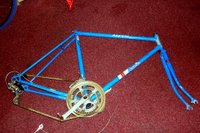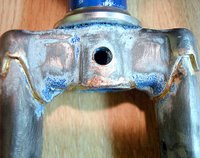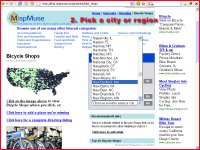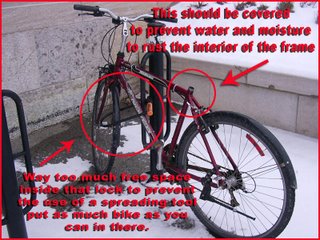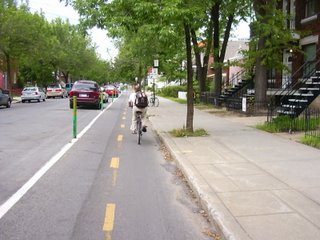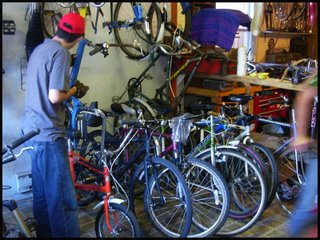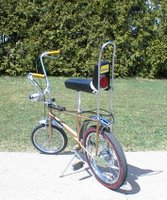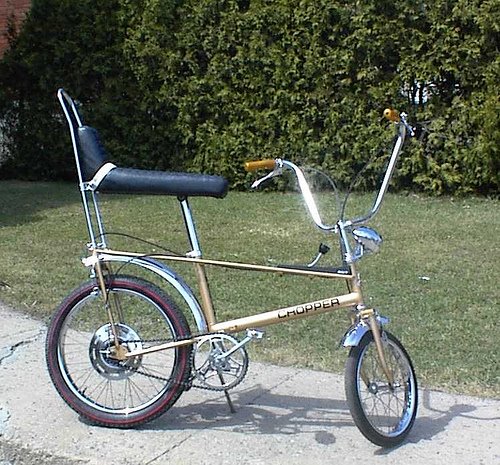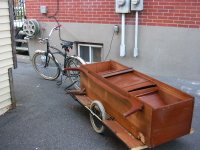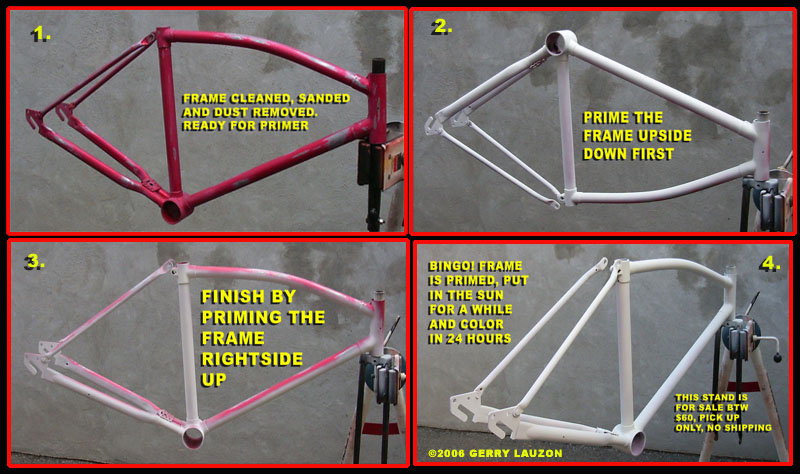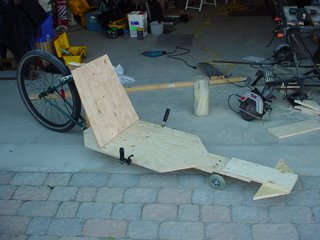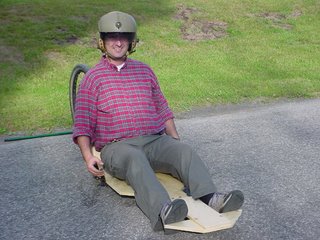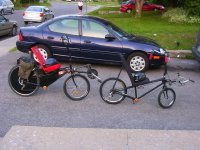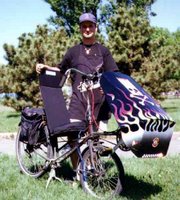IN THE BEGINNING
Bikes have been around for over a hundred years. More bikes are produced in the world every year than cars. A bike makes you 21 times more efficient covering a mile than on foot. A bike is cheap to maintain and operate. Unlike an automobile, you own it, it doesn't own you. Depending on where you live on this earth and your income a bike is either a toy, a recreation device, a transportation vehicle or a tool. With the recent price hike in fuel, bikes are not about to vanish from the transportation map.
All this means is that there will always be a need for people to repair them. Bicycle repair is simple and doesn't require heavy tools, machinery or a large working space. It does however require knowledge, a few specialized tools and a passion for biking. This article is long and you might want to refer to it again. Feel free to bookmark it for later consultation or print a hard copy.
GATHER INTELLIGENCE
Before you start, you need to get solid information. If your lucky enough to have access to a local trade school or community program that will teach you to be a bike mechanic, great! Jump in with both feet, watch and learn. If not, the other way is to teach yourself. First thing you have to do is to get a good technical manual on the subject. I mean a bonifide real hardcopy that you can leave on your workbench for quick reference. Spend the money, in the long run you will see that it's a wise investment. You can read how to fix bikes on the web, but nothing beats a good solid manual that is divided in easy to look up chapters. Even this blog is not complete enough to learn to become a mechanic, I've yet to start on 1/4 of the material that's needed.
Learn to build wheels. No bike mechanic is truly a real bike mechanic without this skill in my opinion. You have to learn this from someone who will sit down with you and explain the process. There are also some great tutorials about wheel building on the web. I had the chance to have both and thru the years I have managed to become a decent wheel builder. Noting is more relaxing for me than to sit down and lace up a new wheel. This is the ultimate craft that you MUST learn. After building a few wheels, aligning them will become very easy.
Lastly, keep informed on the new trends by reading bike magazines on a regular basis. I need to brush up on this myself.
TOOLS OF THE TRADE
You'll need some basic tools like metric size open wrenches, tire spoons, chain breaker tool, a good tire pump with pressure gauge, spoke wrench, a complete set of allen keys, screwdrivers, ratchet set with size 9 to 17mm, wire cutters, adjustable pliers, flat bearing cone wrenches, crank arm pulley tool, a work stand and a trueing stand for wheels. I'm probably missing some stuff, but as you go along in your jedi bike mechanic quest, you'll learn to buy what you need. This list is a good start.
PRACTICE PRACTICE PRACTICE
Now before you go out in the world helping people out by fixing their bikes, there is one thing that every newbie mechanic must do: Take your own bicycle apart to the bare frame, regrease every single bearing in it and put it back together. I don't mean just taking off the wheels and putting them back on. I mean to the bare frame, totally naked with just the paint and stickers. If you can do that and safely ride your bike again after you've rebuilt it, you'll know if you have the ability or not. It won't mean that your good yet, but that you do know what you're doing.
Next thing you'll have to do is to find some donor bikes for parts. Anything is good when salvaging for parts. Many bearings, cranks, brake calipers and chains, to name a few, are common to many kinds of bikes. Never overlook a carcass that you can get your hands on for free, you can always use something on it. Taking apart these donor bikes will do two things for you: You will learn how different types of bikes are put together and you will make yourself a decent supply of spare parts. Don't kid yourself, you probably won't be working on the very latest ride that came out of that fancy bike boutique 2 months ago. Chances are you'll be working on bikes that are pretty similar to the ones you are taking apart, mainly chain store specials. Besides, customers love buying used parts since they pay less and you love selling them because they cost you next to nothing.
WORK ETHICS
When taking a bike in for repair, ask the owner what he/she thinks is wrong with it. Listen in carefully for some clues that might help you out on the repair. Check the bike for loose wheel bearings, bad brakes, out of adjustement shifters, frayed cables, loose pedal axle bearings in front of the customer. Tell him/her what you have observed and your evaluation of the bike. If you suspect that there is a possibility of a major problem, tell the customer right away. People appreciate when they know what they are getting into ahead of time and they hate surprises. They'll also appreciate that you took the time to listen to them. If you get a surprise while doing the job, stop the work, call them up and explain it to them. Give an estimate and ask the customer if the work should go ahead.
When you know you have to replace parts, offer a used part if you have a good one in stock. My gauge is half price from new or less. I also throw in used parts for free sometimes. Everybody loves free stuff. When I have to supply a new part, I will usually charge the same price I paid for it since I buy it retail.
When you fix another persons bicycle, they depend on you for their safety. Anything can happen to them if you've missed or forgotten something. Always, and I mean ALWAYS, take the bike out for a test ride yourself before giving it back to it's owner. One loose bolt or badly adjusted brake cable could represent major injuries or death, REMEMBER THAT.
Keep track of your customers and call them up after a week, or if you see them, and ask if their bike is running good. Should you get a negative answer while the bike and customer is in front of you, make sure you always carry basic tools so you can take care of the problem on the spot. If not, always garanty your work and fix the problem for free as soon as you can. Returning customers is what you are looking for, treat them well. Working on a bike from a return customer is very easy most of the time since you know who was the last mechanic that worked on it.
MARKETING YOUR NEW SKILLS
You should start marketing yourself as soon as possible. Talk to friends and family about your talents even while you are learning them. Offer them to work on their bikes for free, it will give you practice and the quality of your work will be spoken to others. People love to brag about good products or services. If you do great work, your friends and family will not hesitate to give you referrals to potential customers.
Volunteer your time. Don't hesitate to give your time to good causes like bike safety rodeos. Community groups are always in need of mechanics when doing events like these, they'll be more than happy to take your offer and they won't mind you giving away your business card in exchange for your services. You will meet a lot of potential customers and they will get to sample your work. They will ask you questions and ask your opinion on many bike related subjects. Don't be afraid to interact with them and be friendly. This is an opportunity to make contacts and build your reputation.
Advertise on your car(if you have one), on bulletin boards, on local free internet classifieds and on your bike. Be aware that if you chose to advertise on your bike, be sure that it is in perfect running order and that it looks good. Even if you don't have a fancy bike, it still as to be clean and look the part of a well oiled machine. I don't advertise on my bike because it looks like crap! But it runs perfectly and I like the fact that it looks crappy. That's just the way I am.
Get people to know you as more than just a bike mechanic, but a bike guru. Give information on bike related topics like safe riding, cycling health benefits and your own cycling preferences. Remember, this is your passion and you want to share it.
PRICING
Since people are reading this from all over the world, it is hard for me the give an actual price for every single job. One thing I can tell you is that I charge a flat fee for a tune up, plus the cost of parts. Here is my definition of a tune up: The bike comes in running like crap and the bikes goes out running fine. Period, whatever it takes for the bike to run good. Some bikes take me 2 hours and some 20 minutes. I only replace or fix what needs to be fixed because I check everything. In the long run, the average makes it worthwhile and the customers are happy. When customers are happy, they come back and chances are you might have to do less work on that same bike when it goes back in your stand.
Of course I will not charge the same fee if all the customer wants is to replace a brake cable or if he/she wants to strip and rebuild the entire bike.
Don't be greedy and sometimes throw in a freebie, it will always come back to you in a positive way at some point. Giving feels great and I consider myself a millionnaire for the many times I had the joy to see a kids face light up after giving him/her a free bike.
HOME BICYCLE REPAIR OR OPENING A SHOP?
That's a big decision. If you are fortunate enough to live where riding is possible 12 months a year it is much easier to do than in a place like where I am with real cycling business happening only 3 months a year. Working from home to start is always good. You get to build a customer base and that is priceless when starting a new business. Beyond that I can't really help you. I've always been asked why I didn't open a bike shop and my answer has and always will be: I like biking too much. With only 3 nice months to ride here, I don't want to spend them with my elbows in grease in a neon lighted little shop. I prefer doing jobs once and awhile now and I get to choose my customers. I've moved recently and lost all of my customers and realised that I wasn't riding that much anymore. So now I'm more picky about my customers and I only do jobs when I feel like it. If you want help on opening your own shop, check out your local chamber of commerce or of course there is always the web. I gave you the basics for a bike repair business, but I won't get into how to get hooked up with bike manufacturers and parts suppliers. I never did that so I'm not qualified to give you that information. But if you want it bad enough, I'm sure you will find it.
If you decide to get into bicycle repair, either at home or opening a shop, remember this: Everybody offers the same thing at about the same price. People know they have to pay for your services and they are willing to do so. What they are looking for is SERVICE. That is the key in my opinion, great friendly service will always get you more customers.
LAST WORDS
Rule number #1, have fun. If you enjoy what you are doing, you will be a good mechanic, work will always find you and you will keep your passion alive. If you ever decide to start in the bike repair field, email me and let me know how this little article helped you out. I'm also willing to answer any questions. This post will most probably be revised from time to time.
Until then, ride safe and Godspeed.
Gerry





